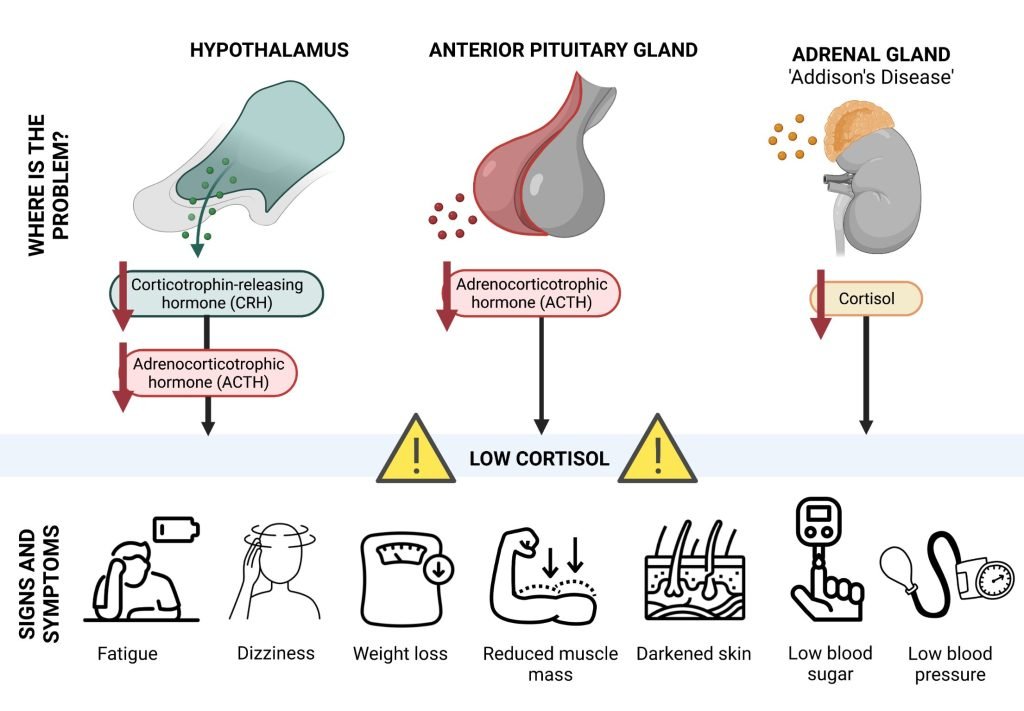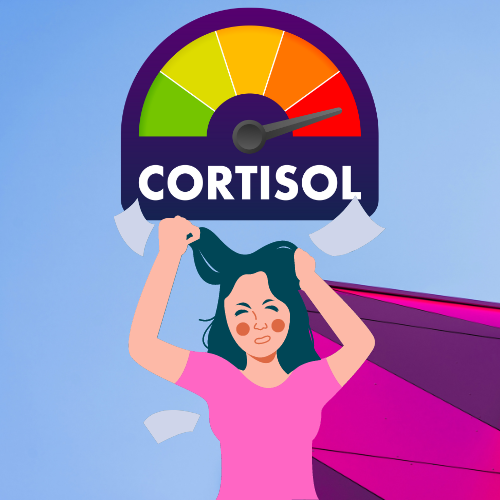Cortisol plays an important role in the stress response. Maintaining an adequate balance of cortisol is essential for health.
Alternative name – Hydrocortisone, a steroid hormone, one of the glucocorticoids.
Glucocorticoids are a group of steroid hormones, made by the outer part (cortex) of the adrenal gland, which have anti-inflammatory effects.
Why we need Cortisol?
Your body is made to react to stress in ways meant to protect you against predators. Such threats are rare today. But that doesn’t mean that life is free of stress.
When you face a perceived threat, a small region at the brain’s base, called the hypothalamus, sets off an alarm system in the body. An example of a perceived threat is a large dog barking at you during your morning walk. Through nerve and hormonal signals, this system prompts the adrenal glands to release a adrenaline and cortisol this is our fight or flight response.
How is Cortisol made in the Body
Secretion of cortisol is mainly controlled by three inter-communicating regions of the body; the hypothalamus in the brain, the pituitary gland and the adrenal gland. This is called the hypothalamic–pituitary–adrenal axis.
Cortisol is a hormone produced by the two adrenal glands, which are located on top of each kidney.
The pituitary gland in the brain regulates the cortisol production.

The hypothalamus secretes corticotrophin-releasing hormone (CRH) which stimulates the anterior pituitary gland to secrete adrenocorticotrophic hormone (ACTH). ACTH travels via the bloodstream and stimulate the secretion of cortisol from the adrenal glands. As the cortisol levels rise, this blocks the release of CRH from the hypothalamus and ACTH from the anterior pituitary gland. As a result, the reduction in CRH and ACTH levels lead to reduced cortisol levels. This is called a negative feedback loop.
Known as a diurnal rhythm. Blood levels of cortisol vary throughout the day, they are generally higher in the morning when we wake up, and then fall throughout the day.
What does this cause?
Adrenaline makes the heart beat faster, causes blood pressure to go up and gives you more energy. Cortisol, the primary stress hormone, increases sugar or glucose, in the bloodstream, enhances the brain’s use of glucose and increases the availability of substances in the body that repair tissues.
Cortisol slows functions that would be nonessential or harmful in a fight-or-flight situation. It changes immune system responses and suppresses the digestive system, the reproductive system and growth processes. This complex natural alarm system also communicates with the brain regions that control mood, motivation and fear.
Once a perceived threat has passed, hormones return to typical levels. As adrenaline and cortisol levels drop, your heart rate and blood pressure return to typical levels. Other systems go back to their regular activities.
Too Much Cortisol
When stressors are always present and you always feel under attack, that fight or flight reaction stays turned on.
Too much exposure to cortisol and other stress hormones can disrupt almost all the body’s processes. This puts you at higher risk of many health problems, including:
- Anxiety.
- Depression.
- Digestive problems.
- Headaches.
- Muscle tension and pain.
- Heart disease, heart attack, high blood pressure and stroke.
- Sleep problems.
- Weight gain.
- Problems with memory and focus.

Too much cortisol over a prolonged period of time can lead to a condition called Cushing’s syndrome.
High cortisol levels over a prolonged time can also cause lack of sex drive and, in women, periods can become irregular, less frequent or stop altogether (amenorrhoea).
Too Little Cortisol

Not enough cortisol can be due to a problem in the pituitary gland or the adrenal gland (Addison’s disease). The onset of symptoms is often very gradual. Symptoms may include fatigue, dizziness (especially upon standing), weight loss, muscle weakness, mood changes and the darkening of regions of the skin.
How can we balance Cortisol
You may be able to lower your cortisol levels with regular exercise, adequate sleep, a nutrient-dense diet, and some supplements, like fish oil.
- Get the right amount of sleep
- Get regular exercise
- Learn to recognise stressful thinking
- Breathe – Deep breathing or square breathing is a technique for stress reduction that can be used anywhere.
- Have fun and laugh – Laughing promotes the release of endorphins and suppresses cortisol.
- Take care of a pet
- Be your best self – Feelings of shame, guilt, or inadequacy can lead to negative thinking and dysregulated cortisol levels.
- Spend time doing a hobby or self care.
- Eat a nutritious diet – Being mindful of the foods you eat may relieve symptoms of stress and help you better manage your cortisol levels. Regular high sugar intake may result in elevated cortisol levels.
- Take fish oils and Ashwagandha.



